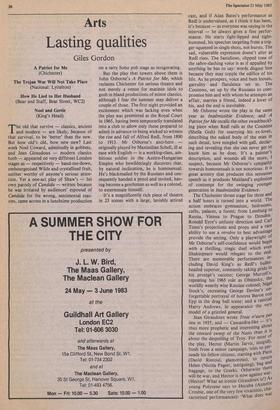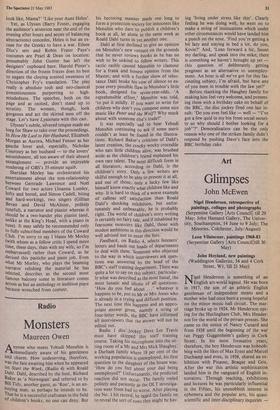Arts
Lasting qualities
Giles Gordon
The Trojan War Will Not Take Place (National: Lyttelton)
rr he old that survive — classics, ancient 1 and modern — are likely, because of that survival, to be 'better' than the new. But how old's old, how new new? Last week Noel Coward, admittedly in gobbets, and Jean Giraudoux — modern classics both — appeared on very different London stages as — respectively — hand-me-down, embourgeoised Wilde and crystallised fruit, neither worthy of anyone's serious atten- tion. Yet a one-act play of Shaw's — his own parody of Candida — written because he was irritated by audiences' espousal of Candida for the wrong, sentimental reas- ons, came across in a lunchtime production
on a tatty Soho pub stage as invigorating.
But the play that towers above them is John Osborne's A Patriot for Me, which reclaims Chichester for serious theatre and not merely a venue for matinee idols to gush in bland productions of minor classics, although I fear the summer may deliver a couple of those. The first night provided an excitement which was lacking even when the play was premiered at the Royal Court in 1965, having been temporarily translated into a club to allow only those prepared to admit in advance to being wicked to witness the rise and fall of Alfred Redl, from 1890 to 1913. Mr Osborne's anti-hero originally played by Maximilian Schell, ill at ease with English — is a working-class, am- bitious soldier in the Austro-Hungarian Empire who bewilderingly discovers that, by natural inclination, he is homosexual. He's blackmailed by the Russians and con- sequently handed a pistol and invited, hav- ing become a gentleman as well as a colonel, to exterminate himself.
It's a magnificently rich piece of theatre in 23 scenes with a large, lavishly attired
cast, and if Alan Bates's performance as Redl is undervalued, as I think it has been, it's because — as everyone was saying in the interval — he always gives a fine perfor- mance. He starts tight-lipped and tight- bummed, his speeches targeting from a trig- ger squeezed in single shots, not bursts. The sad, vulnerable expression doesn't alter as Redl rises. The fastidious, clipped tone of the sabre-slashing voice is as if appalled by anything he has to say: words disgust him because they may topple the edifice of his life. As he prospers, voice and bum loosen, garrulity and flatulence set in. The Countess, set up by the Russians to com- promise him and with whom he attempts an affair, marries a friend, indeed a lover of his, and the end is inevitable.
Mr Osborne wrote the play in the same year as Inadmissible Evidence, and A Patriot for Me recalls the other swashbuckl- ing piece when Redl rails at the Countess (Sheila Gish) for marrying his ex-lover, describing the naked body of the man in such detail, love mingled with gall, declar- ing and revealing that she can never get to knoiv him as he does. It's a painter's description, and wounds all the more, I suspect, because Mr Osborne's sympathy towards homosexuals is not notorious. It is great artistry that produces this sensuous speech as it produces Maitland's explosion of contempt for the swinging younger generation in Inadmissible Evidence. The Chichester thrust stage for three and a half hours is turned into a world. The action embraces gymnasium, bedrooms, cafes, palaces, a forest; from Lemburg to Russia, Vienna to Prague to Dresden. Ronald Eyre's unfussy direction and Carl Toms's projections and props and a rare ability to use a revolve to best advantage provide the setting. Only a playwright of Mr Osborne's self-confidence would begin with a thrilling, tragic duel which even Shakespeare would relegate to the end. There are memorable performances in- cluding David King's as Redl's bullet headed superior, constantly taking pride in his protege's success; George Murcell, s, repeating his 1965 role as OblenskY, the worldly wearily wise Russian colonel; Nigel Stock's, recreating George Devine's un- forgettable portrayal of hostess Baron von Epp in the drag ball scene; and a ramrod Harry Andrews, in appearance the very model of a grizzled general. Jean Giraudoux wrote Troie ,,'aura pas lieu in 1935, and — Cassandra-like — ,s thus more prophetic and interesting about the onward sweep of the Nazis than it is about the despoiling of Troy. For most of the play, Hector (Martin Jarvis, insipid), fresh from a minor campaign, tries to per suade his fellow citizens, starting with Pans (David Rintoul, glamorous), to return Helen (Nicola Pagett, intriguing), bag and baggage, to the Greeks. Otherwise there will be war, and Hector is now against war. (Hector! What an ironist Giraudoux is!) As young Polyxene says to Hecuba (Annette Crosbie, one of the very few vivacious, cha- racterised performances): 'What does war
look like, Mama?' Like your Aunt Helen'.
Yet, as Ulysses (Barry Foster, engaging the audience's attention near the end of the evening after hours and aeons of balancing abstractions) concedes, Helen is but an ex- cuse for the Greeks to have a war. Eileen Diss's sets and Robin Fraser Paye's costumes are Pearl & Dean on location: presumably John Gunter has left the designers' cupboard bare. Harold Pinter's direction of the frozen friezes does its best to negate the cloying scented sweetness of Christopher Fry's translation. The play really is absolute tosh and neo-classical pretentiousness purporting to high- mindedness. The speeches, both on the page and as recited, don't stand up to scrutiny. The women, though, look gorgeous and act the skirted men off the stage. Let's have Lysistrata with this cast.
Ulysses's subtle, silvered tongue made me long for Shaw to take over the proceedings. In How He Lied to Her Husband, Elizabeth Morgan as Aurora, Michael Fenner as her gauche lover and, especially, Nicholas Courtney as her husband — to the lovers' astonishment, all too aware of their absurd entanglement — provide an enjoyable rendering of GBS's 35-minute squib.
Sheridan Morley has orchestrated his entertainment about the non-relationship between Gertrude Lawrence and Noel Coward for two actors (Joanna Lumley, lofty and bored, and Simon Cadell, biting and hard-working), two singers (Gillian Bevan and David McAlister, politely tuneful), a narrator and pianist whereas it should be a two-hander plus pianist (and, unlike at the King's Head, with a piano in tune). It may safely be recommended only to fully subscribed members of the Coward Club. I'm sorry to say I blame Mr Morley (with whom as a fellow critic I spend more time, these days, than with my wife, so I'm embarrassed) rather than Coward, as he devised this pastiche and paste job. Even what Mr Morley, who plays the beaming narrator relishing the material he has selected, describes as the second most famous balcony scene in literature comes across as but an anthology or audition piece because wrenched from context.











































 Previous page
Previous page